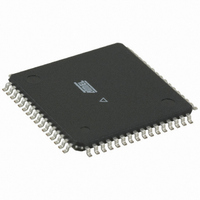AT90CAN32-16AU Atmel, AT90CAN32-16AU Datasheet - Page 77

AT90CAN32-16AU
Manufacturer Part Number
AT90CAN32-16AU
Description
IC MCU AVR 32K FLASH 64-TQFP
Manufacturer
Atmel
Series
AVR® 90CANr
Specifications of AT90CAN32-16AU
Core Processor
AVR
Core Size
8-Bit
Speed
16MHz
Connectivity
CAN, EBI/EMI, I²C, SPI, UART/USART
Peripherals
Brown-out Detect/Reset, POR, PWM, WDT
Number Of I /o
53
Program Memory Size
32KB (32K x 8)
Program Memory Type
FLASH
Eeprom Size
1K x 8
Ram Size
2K x 8
Voltage - Supply (vcc/vdd)
2.7 V ~ 5.5 V
Data Converters
A/D 8x10b
Oscillator Type
Internal
Operating Temperature
-40°C ~ 85°C
Package / Case
64-TQFP, 64-VQFP
Processor Series
AT90CANx
Core
AVR8
Data Bus Width
8 bit
Data Ram Size
2 KB
Interface Type
2-Wire/SPI/USART
Maximum Clock Frequency
16 MHz
Number Of Programmable I/os
53
Number Of Timers
4
Operating Supply Voltage
2.7 V to 5.5 V
Maximum Operating Temperature
+ 85 C
Mounting Style
SMD/SMT
3rd Party Development Tools
EWAVR, EWAVR-BL
Development Tools By Supplier
ATAVRDRAGON, ATSTK500, ATSTK600, ATAVRISP2, ATDVK90CAN1, ATADAPCAN01
Minimum Operating Temperature
- 40 C
On-chip Adc
8-ch x 10-bit
No. Of I/o's
53
Eeprom Memory Size
1KB
Ram Memory Size
2KB
Cpu Speed
16MHz
No. Of Timers
4
Rohs Compliant
Yes
For Use With
ATSTK600-TQFP64 - STK600 SOCKET/ADAPTER 64-TQFP770-1007 - ISP 4PORT ATMEL AVR MCU SPI/JTAG770-1005 - ISP 4PORT FOR ATMEL AVR MCU JTAG770-1004 - ISP 4PORT FOR ATMEL AVR MCU SPIATDVK90CAN1 - KIT DEV FOR AT90CAN128 MCU
Lead Free Status / RoHS Status
Lead free / RoHS Compliant
Available stocks
Company
Part Number
Manufacturer
Quantity
Price
Company:
Part Number:
AT90CAN32-16AU
Manufacturer:
ATMEL
Quantity:
250
Part Number:
AT90CAN32-16AU
Manufacturer:
MICROCHIP/微芯
Quantity:
20 000
- Current page: 77 of 428
- Download datasheet (6Mb)
7679H–CAN–08/08
MOSI, SPI Master Data output, Slave Data input for SPI channel. When the SPI is enabled as a
slave, this pin is configured as an input regardless of the setting of DDB2. When the SPI is
enabled as a master, the data direction of this pin is controlled by DDB2. When the pin is forced
to be an input, the pull-up can still be controlled by the PORTB2 bit.
• SCK – Port B, Bit 1
SCK, Master Clock output, Slave Clock input pin for SPI channel. When the SPI is enabled as a
slave, this pin is configured as an input regardless of the setting of DDB1. When the SPI is
enabled as a master, the data direction of this pin is controlled by DDB1. When the pin is forced
to be an input, the pull-up can still be controlled by the PORTB1 bit.
• SS – Port B, Bit 0
SS, Slave Port Select input. When the SPI is enabled as a slave, this pin is configured as an
input regardless of the setting of DDB0. As a slave, the SPI is activated when this pin is driven
low. When the SPI is enabled as a master, the data direction of this pin is controlled by DDB0.
When the pin is forced to be an input, the pull-up can still be controlled by the PORTB0 bit.
Table 9-7
in
nal, while MOSI is divided into SPI MSTR OUTPUT and SPI SLAVE INPUT.
Table 9-7
in
Table 9-7.
Note:
Signal Name
PUOE
PUOV
DDOE
DDOV
PVOE
PVOV
PTOE
DIEOE
DIEOV
DI
AIO
Figure 9-5 on page
Figure 9-5 on page
1. See
and
and
Table 9-8
Overriding Signals for Alternate Functions in PB7..PB4
Table 9-8
“Output Compare Modulator - OCM” on page 165
PB7/OC0A/OC1C
0
0
0
0
OC0A/OC1C
ENABLE
OC0A/OC1C
0
0
0
–
–
72.
72. SPI MSTR INPUT and SPI SLAVE OUTPUT constitute the MISO sig-
relates the alternate functions of Port B to the overriding signals shown
relate the alternate functions of Port B to the overriding signals shown
(1)
(1)
PB6/OC1B
0
0
0
0
OC1B ENABLE
OC1B
0
0
0
–
–
AT90CAN32/64/128
PB5/OC1A
0
0
0
0
OC1A ENABLE
OC1A
0
0
0
–
–
for details.
PB4/OC2A
0
0
0
0
OC2A ENABLE
OC2A
0
0
0
–
–
77
Related parts for AT90CAN32-16AU
Image
Part Number
Description
Manufacturer
Datasheet
Request
R

Part Number:
Description:
Manufacturer:
Atmel Corporation
Datasheet:

Part Number:
Description:
Manufacturer:
Atmel Corporation
Datasheet:

Part Number:
Description:
IC MCU AVR 32K FLASH 64-QFN
Manufacturer:
Atmel
Datasheet:

Part Number:
Description:
Microcontroller with 32K/64K/128K Bytes of ISP Flash and CAN Controller
Manufacturer:
ATMEL [ATMEL Corporation]
Datasheet:

Part Number:
Description:
8-bit Microcontroller with 16K/32K/64K Bytes In-System Programmable Flash8-bit Microcontroller with 32K/64K/128K Bytes of ISP Flash and CAN Controller
Manufacturer:
ATMEL [ATMEL Corporation]
Datasheet:

Part Number:
Description:
MCU AVR 32K FLASH 16MHZ 64-TQFP
Manufacturer:
Atmel
Datasheet:

Part Number:
Description:
DEV KIT FOR AVR/AVR32
Manufacturer:
Atmel
Datasheet:












